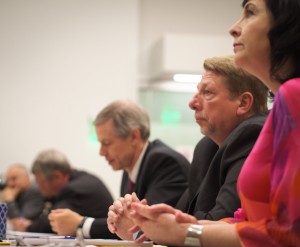
Nearly two months after its regular deadline, the Alaska Legislature finally gavels out. Both chambers have approved a $5 billion operating budget and agreed on a way to pay for the deficit.
There will be no government shutdown, or an eleventh-hour deal to avert one. If you’re a glass-half-full type, you could say the Legislature even brokered a compromise with a couple weeks to spare.
The big sticking point was the cost-of-living increases that public employees had negotiated in their contracts. During the House floor session, Finance co-chair Mark Neuman explained that the Legislature would pay for the raises this year, but there were conditions.
“Number one, that these are one-time increments. Two, that there be no cost-of-living pay raises beginning with collective bargaining agreements negotiated in 2015.”
The Legislature was also directing Gov. Bill Walker to make $30 million in agency cuts to offset the raises.
Neuman, a Big Lake Republican, also explained that the final version of the operating budget also restored some money for education, the ferry system, senior benefits, and public broadcasting.
While there was a deal, there was also grumbling from both sides. Mat-Su Republican Mike Dunleavy defended some the more contentious reductions that had been made by the Senate, noting that cuts will need to be even deeper next year.
“We’re looking at a $4 billion deficit. And if people thought it was difficult this year, it’s not going to be any easier next year. And some sacred cows that escaped a haircut this year — some of those sacred cows might actually be butchered coming into the next year.”
Meanwhile, Democrats expressed disappointment that the Legislature did not consider scaling back oil tax credit payments or accept federal money for Medicaid expansion. In both chambers, the minority was split on the budget for these reasons.
But they all voted to tap the state’s rainy day account. Senate Minority Leader Berta Gardner said the multi-billion-dollar draw was necessary to cover the state’s budget deficit, and prevent the government from grinding to a halt.
“My objections to the underlying budget are not strong enough to take us back to the brinksmanship. They’re not strong enough to endanger the Permanent Fund dividend, which is a proposal that’s been floated to this special session, and we remain committed to trying to protect the fund for future generations. Lastly, I don’t want to add even another single day to this special session.”
There was one area where there was unanimous agreement.
According to the Legislature’s accounting staff, the cost of the extended and special sessions exceeds half a million dollars [$668,000].
agutierrez (at) alaskapublic (dot) org | 907.209.1799 | About Alexandra




